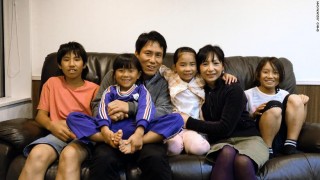Loading
Search
▼ Japan's Fertility Crisis Even Worse Than Before As Births Fall Sharply
- Category:Other
(CNN)Japan's fertility crisis is worsening, with data from the first seven months of this year showing the sharpest drop in births in 30 years, according to preliminary government data.
Births fell 5.9% from January to July year on year, as the pool of women of childbearing age shrinks and more women delay having children or decide not to have them at all, figures from the Ministry of Health, Labor and Welfare show.
During this period, the total number of births was 518,590. For the whole of 2018, the official tally of births was 918,397, a figure which however excludes babies born to foreigners in Japan and Japanese babies born abroad.
The decline in births is "happening faster than official projections had envisioned," said Yasushi Mineshima, a spokesman for the National Institute of Population and Social Security Research.
Japan's birth rate has been falling since the late 1970s. In 2005, it reached a record low of 1.26, but then seemed to be on a path of recovery until it started to fall again in 2016, according to government figures. By 2018, it was at 1.42.
To maintain a stable population, countries need a fertility rate of 2.1. Last year, it was 1.72 in the United States but only 0.98 -- or less than one baby per woman -- in South Korea, where fertility rates have fallen to their lowest level since records began.
Mineshima believes Japan's crisis is due to a shrinking pool of women of childbearing age. "The children of baby-boomers are reaching their late 40s, which is causing a radical drop in births," he said.
Women are also delaying having children as more of them enter the workforce, according to a government analysis. The average age of a mother when her first child was born rose from 25.6 in 1970 to 30.7 in 2018.
Less weddings, more virgins
Another cause for Japan's declining birth rate is the fall in marriage rates, with having children outside of wedlock still frowned upon.In 2018, the marriage rate stood at 4.7 per 1,000 members of the population, compared to over 10 in the 1970s, according to official statistics. In 2015, the proportion of those who had never married at age 50 reached 23% for men and 14% for women, the highest levels ever.
Sexual inexperience is also on the rise in the country, with the percentage of women between the ages of 18 and 39 who had never had sex rising to 24.6% in 2015 from 21.7% in 1992, according to a study from the University of Tokyo. The change was greater for men of the same age, with 25.8% of men aged between 18 and 39 who had never had sex in 2015, up from 20% in 1992.
The issue of birth rate is important in Japan because its population is aging rapidly. Japan is considered a "super-aged" nation, meaning 28% of its population is over 65 years old and the workforce is shrinking drastically, according to the government figures.
It is also having an impact on the country's overall population, which stood at 126 million in 2018, down by 260,000 from the year before. By 2065, the population is expected to drop to about 88 million.
To counter these trends, the government has set a fertility rate target of 1.8, according to The Economist Intelligence Unit. It has focused its efforts on improving women's work-life balance by increasing the number of places in day care centers and providing more parental leave.
- October 9, 2019
- Comment (0)
- Trackback(0)


